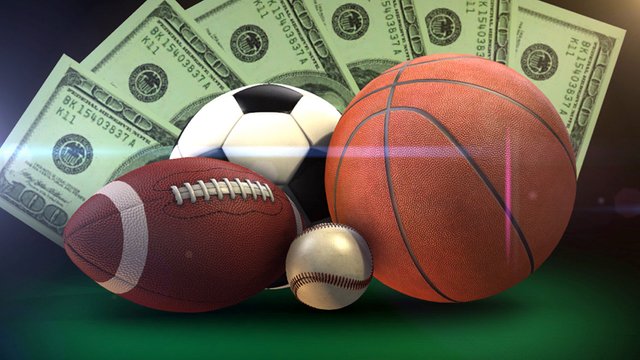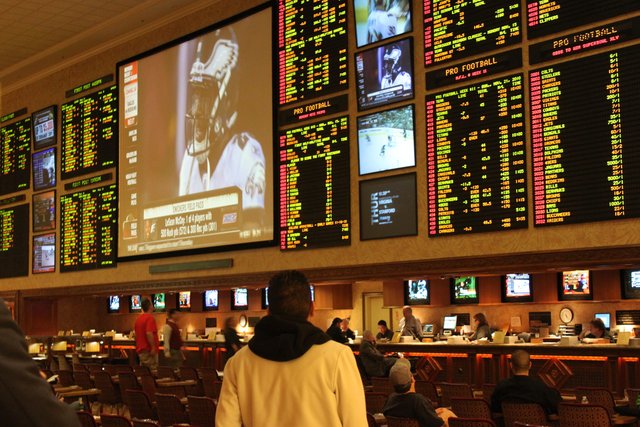
The world of sports betting can be a fun and exciting place, as well as a great method to make some quick cash. But before you dive in and begin sports betting, it’s probably a good idea to know what all of the terms used in sports betting mean.
Whether you are a novice sports bettor, or a long-time pro that just wants some clarification on what terms in the industry mean, keep reading to learn more about sports betting terms.
 What is Spread?
What is Spread?
In sports betting, it is common to say you are betting on the spread, but what exactly are your betting on here? Well the spread is the margin that you expect the team you are betting on to either win or lose by. But spread betting isn’t just for team sports, as it can apply in individual sports like golf and tennis as well.
When you get to the sportsbook to place your bet, the spread will be a number, sometimes with a decimal place, and a plus or minus in front of it. If a team has a minus, or negative sign, in front of the number by their name, this means that they are the favorite in that game and must win by the number of points depicted for the bet to pay out. For example, if the spread is -7.5, then your team needs to win by at least 8 points for you to win money. On the other hand, if there is a plus sign by the number, such as +7.5 this means the team is the underdog, and that if they lose, but by less than 8 points, you will still win the bet. You will additionally win the bet if this team wins.
What is a Moneyline Bet?
If the spread sounds a bit too confusing for you, not to worry, as there is an easier style of betting, known as a moneyline bet. Unlike a spread bet, when someone bets moneyline, this means they are betting outright on a team to win the game. Betting moneyline can be confusing because these numbers also have plus and minus signs in front of them.
These pluses and minuses are different on moneyline bets however, because they tell you how much you will win when you bet on that team. If you see a number like +250, this means that for every $1 you bet on the game, if you win, you will receive $2.50, so think of it like a percentage payout number. A negative sign followed by a number lets you know that you will have to bet much more to win less. For example, a -105 means you will have to bet $105 in order to win $100, and this typically happens when a team is favored.
What Does Over/Under Mean?
When you watch an NFL game with your friends, you might hear someone saying they bet on the over/under. But this leaves many novice sports bettors wondering just what aspect of the game has been bet on.
Essentially, when you bet on the over/under of a game, you are betting on the total point score of the game of both teams combined. And you are betting on if that number will be higher or lower than the ones the line makers predicted. So if the Miami Dolphins are playing the Buccaneers, the line makers decided the game will have a total score of 52 points. It is then up to you to bet whether you think the final number of points scored will be over, or under 52.
What is a Parlay Bet?
As you become more involved in the sports betting world, you may become more confident tackling more difficult bets, and one of these more challenging bets (to win, not to make) is called a parlay bet.
A parlay bet is a single wager that involves multiple variables. So instead of betting on the outcome of one game, you may bet on the outcome of three. This will give you better odds, but only if all three teams win their games. For example, you will wage $100 parlay on 3 NBA teams you select, and in order to win your money back, and earn a profit, The Los Angeles Lakers, Utah Jazz, and Denver Nuggets must all have winning games that day. If even one team loses, you will lose your bet entirely.
Although parlay bets tend to be a bit riskier, they are also more rewarding, as the chances of winning are slimer so the odds tend to be more favorable for gamblers.
What is a Prop Bet?
A prop bet is a fun (and risky) way to bet on one single aspect of the game. Common prop bets include betting on the outcome of the coin toss, if an athlete will say, or do, a specific action, or how many fouls a specific player will have. Prop bets are common in the larger sports, but can also be found for smaller games, for mid-game entertainment, and even for political events. One of the most common places to find prop bets is actually during the Olympic Games.
Other Terms to Know
Now that you know the main terms in sports betting and what they refer to, you should feel confident to go out and place some bets. However, there are several less commonly used terms you may come across during your sports betting journey that are worth mentioning.
- Push—You may hear this term in conjunction to the outcome of a bet. If a bet is a “push” this means that the bettors bet falls exactly on the line created by the line maker. Then if the team wins by the line makers exact margin, the bettor will get their money back.
- Exposure—Exposure in sports betting is another word for risk. If you have a lot of exposure, this means you are taking a lot of risk.
- Asian Handicap—This is a special way to bet soccer in which the team favored to win is handicapped. A handicap is where odds which are entirely unfavorable to bettors are adjusted to make the game more attractive to bettors.
- Fixed Odds—Fixed odds are when a bet opens for a game and the point spread stays the same until the sports book stops taking bets for said game.
- Opening Line—Point spreads will often vary as it gets closer to a game. The opening line is the initial spread that is present when the sportsbook begins taking bets on the game.
- Dime Line—Sports books have to make their money too, and this is why they typically take 10% of every winning bet. This creates a problem though, because when betting on moneyline, and there is only a 10-point difference in the bets (i.e. -125/+115) this means that even if you win, any winnings will go to the sports book. You want to avoid betting on the Dime Line.
- Edge—The edge is used to specify who has the advantage on a certain bet, typically either the player, or the sportsbook.
- Live Betting—This one is a bet self-explanatory, but it is when a sports book is continuing to take bets on the game while it is occurring.
- Off The Board—When a sportsbook tells you that something is off the board, this means they are no longer taking bets on that event. This is named as such because the odds for the said game will disappear from the board, indicating betting is closed.
Betting on sports is a whole world of its own, and it’s okay if you aren’t exactly sure where to begin. Sports betting is a learning curve and you will get the hang of it as you go along! For more information, as well as news about sports betting, follow our blog at MintDice.com
If you are interested in other Bitcoin games of skill you may want to look at BitRocket - available exclusively on MintDice.
Downvoting a post can decrease pending rewards and make it less visible. Common reasons:
Submit